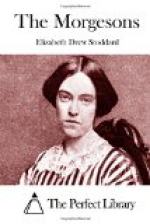Home, father said, was her sphere. All that she required, he thought he could do; but of me he was doubtful. Where did I belong? he asked.
I was still “possessed,” Aunt Merce said, and mother called me “lawless.” “What upon earth are you coming to?” asked Temperance. “You are sowing your wild oats with a vengeance.”
“Locke Morgeson’s daughter can do anything,” commented the villagers. In consequence of the unlimited power accorded me I was unpopular. “Do you think she is handsome?” inquired my friends of each other. “In what respect can she be called a beauty?” “Though she reads, she has no great wit,” said one. “She dresses oddly for effect,” another avowed, “and her manners are ridiculous.” But they borrowed my dresses for patterns, imitated my bonnets, and adopted my colors. When I learned to manage a sailboat, they had an aquatic mania. When I learned to ride a horse, the ancient and moth-eaten sidesaddles of the town were resuscitated, and old family nags were made back-sore with the wearing of them, and their youthful spirits revived by new beginners sliding about on their rounded sides. My whims were sneered at, and then followed. Of course I was driven from whim to whim, to keep them busy, and to preserve my originality, and at last I became eccentric for eccentricity’s sake. All this prepared the way for my Nemesis. But as yet my wild oats were green and flourishing in the field of youth.
CHAPTER XIII.
I was preaching one day to mother and Aunt Merce a sermon after the manner of Mr. Boold, of Barmouth, taking the sofa for a desk, and for my text “Like David’s Harp of solemn sound,” and had attracted Temperance and Charles into the room by my declamation, when my audience was unexpectedly increased by the entrance of father, with a strange gentleman. Aunt Merce laughed hysterically; I waved my hand to her, a la Boold, and descended from my position.
“Take a chair,” said Temperance, who was never abashed, thumping one down before the stranger.
“What is all this?” inquired father.
“Only a Ranz des Vaches, father, to please Aunt Merce.”
The stranger’s eyes were fastened upon me, while father introduced us to “Mr. Charles Morgeson, of Rosville.”
“Please receive me as a relative,” he said, turning to shake hands with mother. “We have an ancestor in common that makes a sufficient cousinship for a claim, Mrs. Morgeson.”
“Why not have looked us up before?” I asked.
“Why,” said Veronica, who had just come in, “there are six Charles Morgesons buried in our graveyard.”
“I supposed,” he said, “that the name was extinct. I lately saw your father’s in a State Committee List, and feeling curious regarding it, I came here.”




